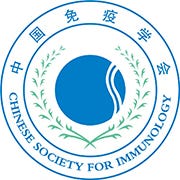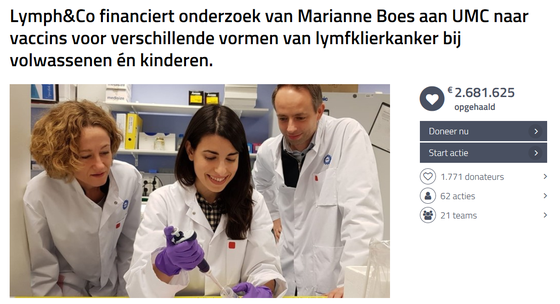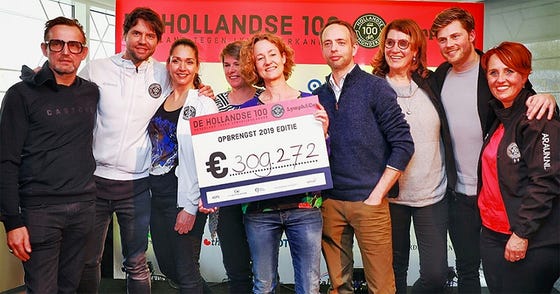Optimizing immune recognition - Group Boes
Optimizing immune recognition - Group Boes
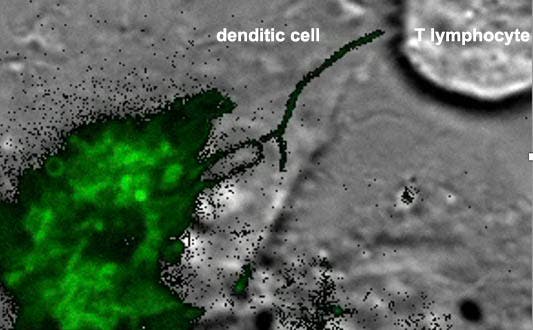
Aboutuitklapper, klik om te openen
My lab explores mechanisms that drive immune recognition in human disease. It is becoming increasingly clear that many diseases have an inflammatory component to them that may be treatable by immune response modification. Cancer is one such disease, that moreover touches on many aspects of immune recognition. Our approach to finding mechanisms in human disease is to study common traits in diseases of limited complexity (primary immunodeficiencies presenting with autoinflammation) and conditions of increasing complexity (rheumatoid disorders, cancer). From 2003-2008, my laboratory was located at Harvard Medical School/Brigham and Women’s Hospital in Boston, USA. Since 2008, we are located at the UMC-Utrecht.
Group membersuitklapper, klik om te openen
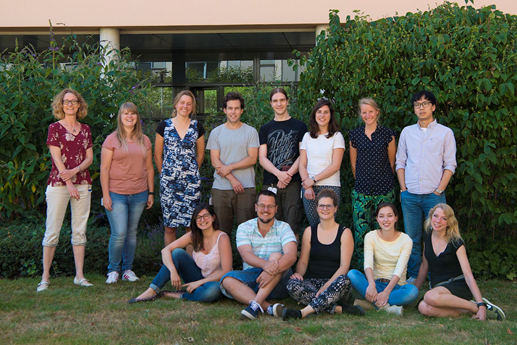
Post-docs
PhD students
- Nila Servaas
- Emmerik Leijten
- Francesca Ververs
- Sandra Silva Cardoso
- Bas Smits
- Mischa Koenen
- Patrick Greve
- Sarah Schep
- Xiaogang Zhang
- Juliette Pouw
Group Leader

dr. M.L. Boes
Associate Professor
Research programsuitklapper, klik om te openen
Infection and Immunity
Child Health
Research interestsuitklapper, klik om te openen
- Immunology
- Antigen presentation
- Immune recognition
- Human disease
- Pediatric
KEY PUBLICATIONSuitklapper, klik om te openen
- Bystander T-cells support T-cell activation by controlling the release of dendritic cell-derived immune-stimulatory extracellular vesicles. Lindenbergh MFS, Koerhuis DGJ, Borgh EGF, van ‘t Veld EM, Driedonks TAP, Wubbolts R, Stoorvogel W, Boes M. Front Immunol. 2019 Mar 12; 10:448. IF: 4.716; PMID: 30915085 View
- Nedd4 Binding Protein 1 (N4BP1) and TNFAIP3 Interacting Protein 1 (TNIP1) control MHC-1 display in neuroblastoma. Spel L, Nieuwenhuis J, Haarsma R, Stickel E, Bleijerveld OB, Altelaar M, Boelens JJ, Brummelkamp TR, Nierkens S, Boes M. Cancer Res. 2018 Dec 1;78(23):6621-6631. IF: 8.378; PMID: 30213788 View
- Proline-serine-threonine phosphatase interacting protein 1 (PSTPIP1) controls immune synapse stability in human T cells. Janssen WJM, Grobarova V, Leleux J, Jongeneel L, van Gijn M, van Montfrans JM, Boes M. J Allergy Clin Immunol. 2018 Dec;142(6):1947-1955. IF: 14.110; PMID: 29432774 View
- Fcg receptor antigen targeting potentiates cross-presentation by human blood and lymphoid tissue BDCA-3+ dendritic cells. Flinsenberg TW, Compeer EB, Koning D, Klein M, Amelung FJ, van Baarle D, Boelens JJ, Boes M. Blood. 2012 Dec 20;120(26):5163-72. IF: 16.562; PMID: 23093620 View
- T cell engagement of dendritic cells rapidly rearranges MHC class II transport. Boes M, Cerny J, Massol R, Op den Brouw M, Kirchhausen T, Chen J, Ploegh HL. Nature. 2002 Aug 29;418(6901):983-8 IF: 43.070; PMID: 12198548. View
View all publications
Collaborationsuitklapper, klik om te openen
van Creveldkliniek
Prof Dr Roger Schutgens, Dr. Kathelijn Fischer
Princes Maxima Centrum voor Kinderoncologie
Dr. Friederike Meyer-Wentrup
UU Veterinary Department
Prof. Dr. Willem Stoorvogel
Molecular Cancer Research
Dr. Eric Kalkhoven
Boston Children's Hospital
Prof. Dr. Hidde Ploegh
Phd Thesesuitklapper, klik om te openen
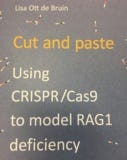
Cut and Paste : Using CRISPR/Cas9 to model RAG1 deficiency
Lisa Ott de Bruin
2018

Classing it up to get noticed: MHC class 1 antigen display in dendritic cells and neuroblastoma
Lotte Spel
2018
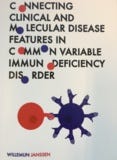
Connecting clinical and molecular disease features in common variable immunodeficiency disorder
Willemijn Janssen
2017
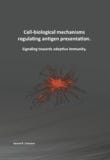
Cell‐biological mechanisms regulating antigen presentation
Ewoud Compeer
2015
Prizesuitklapper, klik om te openen
| Lymph&Co Grant award Marianne Boes (2019) | |
|---|---|
| iGEM worldwide competition UU/UMCU team 2 bronze medals (2018) | |
| Tom Voute Young Investigator Award Lotte Spel (2016) |
UMC newsuitklapper, klik om te openen
2019 Sep: Onderzoek naar vaccin voor lymfeklierkanker van start
Education & Coursesuitklapper, klik om te openen
Educational Comittee Life Sciences
Since 2017, Marianne Boes is a staff member of the Educational Comittee Life Sciences that assesses and ensures the quality of education of the master's programmes within the Graduate School of Life Sciences.


